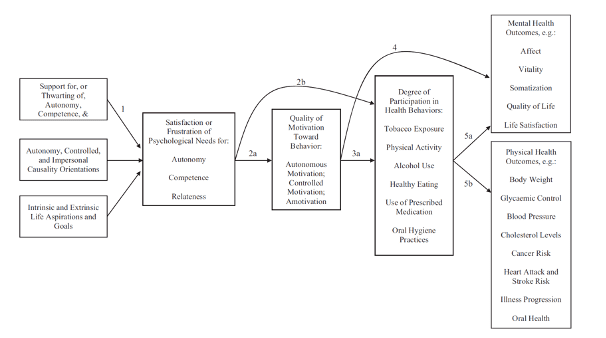Motivation plays a central role for health behavior change and associated health outcomes (both physical and mental). For example, leading causes of death such as cardiovascular disease and many forms of cancer, are determined at least in part by people’s behaviors and lifestyles. Yet, diminishing health-compromising behaviors like smoking, abusing alcohol, overeating, or being sedentary can be hard. So can engaging in health-promoting behaviors such as exercise, controlling glucose levels, or following a medication regimen. SDT research demonstrates that to make meaningful behavior changes, individuals need to feel autonomous in their motivation and to have their basic psychological needs satisfied. Such outcomes are more likely to be achieved in health promotion and health care settings that are need supportive.
For instance, health-care providers play an especially important role in supporting patients’ psychological needs. By listening to patients’ perspectives, providing opportunities for choice in how treatment plans are enacted, acknowledging negative feelings, being empathetic, and providing clear explanations and rationales, practitioners increase the likelihood that patients will be successful in their behavior change attempts-and for the long term! Importantly, we now have a new classification system (by Teixeira et al., 2021) of need supportive behaviors that exemplifies how health promotion and health care professionals can be trained to be need supportive. SDT intervention studies indicate that training in providing need support can help physicians provide greater support and better care to their patients.

SDT health research and clinical trials have examined both patient motivation and provider need support in a wide variety of health areas, including weight loss, glucose control, tobacco cessation, medication adherence, increasing activity/exercise, healthy eating, dental hygiene, and others. This work supports the SDT health-care process model showing that individuals experience better mental and physical health outcomes when they are in need supportive health care and health promotion environments; such effects are mediated by psychological need satisfaction and autonomous motivation. See associated readings for reviews of SDT-informed interventions in the health domain.
The types of wellness goals individuals set also determine wellness outcomes. For example, healthy eating that is motivated by the aspiration to increase one’s physical attractiveness (extrinsic aspiration) is likely to be less successful than when this same behavior is undertaken with the goal of improving health and increasing vitality (intrinsic aspiration). Lastly, autonomous causality orientations (pre-dispositions toward autonomy) are more likely to facilitate positive health behavior change.
A different strand of research within this field has also examined motivational processes and wellness among practitioners. Articles here include studies of the role of basic need supports in both professional training and practice, as well as studies of factors affecting practitioner-patient relations.







